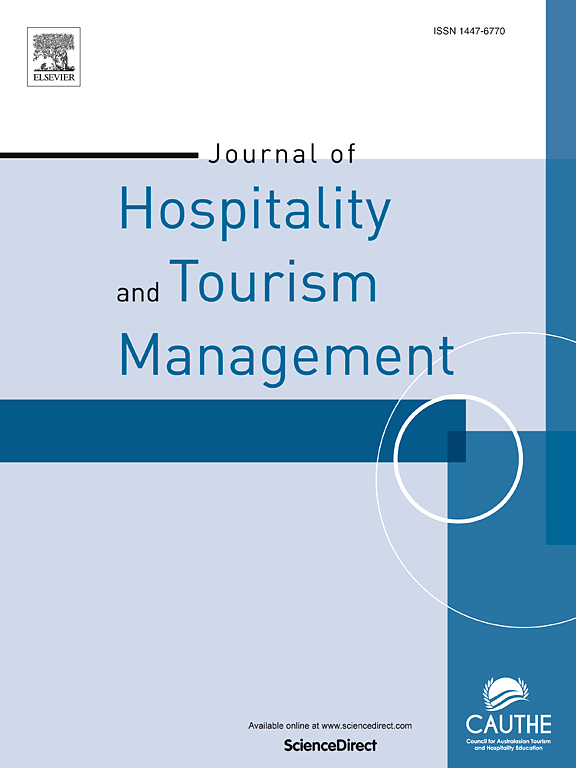The impact of corporate social responsibility on employee outcomes in the hospitality industry: A multi-motive and cross-cultural meta-analysis
IF 7.6
1区 管理学
Q1 HOSPITALITY, LEISURE, SPORT & TOURISM
引用次数: 0
Abstract
Corporate social responsibility (CSR) in the hospitality industry has received increased attention from both practitioners and researchers in the past two decades, due in part to growing concerns regarding hospitality operations' impact on the environmental, social, and economic well-being of their communities. While research has enhanced our understanding of CSR's influence on hospitality employees, an integrated literature synthesis is still needed. Leveraging the multi-motive CSR framework, we aim to (1) synthesize CSR's impact on hospitality employee outcomes (i.e., performance, job satisfaction, and organizational identification); (2) investigate how the instrumental, relational, and moral motives of employees mediate the CSR–employee performance relationship; and (3) test how country-level factors moderate the relationship between CSR employee outcomes. Meta-analytic results using 87 studies, 33,567 individuals, and 160 effect sizes show a positive relationship between CSR and employee outcomes. Further exploring the multi-motive framework, meta-analytic structural equation modeling (MASEM) results show that instrumental, relational, and moral motives fully mediated the CSR–employee performance relationship. Additionally, results of subgroup tests indicate that the CSR–employee outcome relationship was stronger for employees working in highly developed countries and horizontal-individualistic cultures. Our findings highlight how CSR enhances employee performance through underlying psychological mechanisms, with implications for theory and practice.
企业社会责任对酒店业员工成果的影响:多动机和跨文化荟萃分析
在过去的二十年里,酒店业的企业社会责任(CSR)受到了从业人员和研究人员越来越多的关注,部分原因是人们越来越关注酒店经营对其所在社区的环境、社会和经济福祉的影响。虽然相关研究加深了我们对企业社会责任对酒店业员工影响的理解,但我们仍然需要对相关文献进行综合归纳。利用企业社会责任的多动机框架,我们的目标是:(1)综合企业社会责任对酒店业员工结果(即绩效、工作满意度和组织认同)的影响;(2)研究员工的工具动机、关系动机和道德动机如何调节企业社会责任与员工绩效之间的关系;以及(3)检验国家层面的因素如何调节企业社会责任与员工结果之间的关系。使用 87 项研究、33,567 个个体和 160 个效应大小进行的元分析结果表明,企业社会责任与员工绩效之间存在正相关关系。元分析结构方程模型(MASEM)进一步探索了多动机框架,结果显示,工具动机、关系动机和道德动机完全调节了企业社会责任与员工绩效之间的关系。此外,分组测试结果表明,在高度发达的国家和横向个人主义文化中工作的员工的企业社会责任与员工绩效之间的关系更为密切。我们的研究结果凸显了企业社会责任如何通过潜在的心理机制提高员工绩效,并对理论和实践产生了影响。
本文章由计算机程序翻译,如有差异,请以英文原文为准。
求助全文
约1分钟内获得全文
求助全文
来源期刊
CiteScore
13.30
自引率
8.40%
发文量
177
审稿时长
45 days
期刊介绍:
Journal Name: Journal of Hospitality and Tourism Management
Affiliation: Official journal of CAUTHE (Council for Australasian Tourism and Hospitality Education Inc.)
Scope:
Broad range of topics including:
Tourism and travel management
Leisure and recreation studies
Emerging field of event management
Content:
Contains both theoretical and applied research papers
Encourages submission of results of collaborative research between academia and industry.

 求助内容:
求助内容: 应助结果提醒方式:
应助结果提醒方式:


